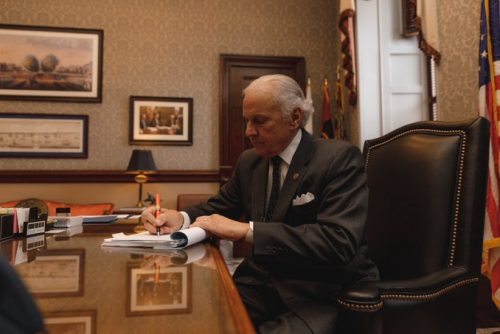New SC law allows military spouses to begin work immediately
On Monday, South Carolina honored those who gave their lives fighting for our country’s freedom.
On Tuesday, with the signature of Governor McMaster, South Carolina acted in support of those who fight for our freedom today.
S.455, now permanent law, cuts occupational licensing red tape, allowing spouses of our military to get to work as soon as they move to South Carolina.
The new statute, known as The Armed Service Members and Spouses Professional and Occupational Licensing Act, directs the state Department of Labor, Licensing and Regulation (LLR) to issue temporary licenses to spouses of active military who already hold a license in another state, removing one of the many time-consuming and costly aspects of transition for them.
You have heard about this bill from us before. We wrote about the importance of this legislation back in February when it passed a legislative conference committee, and in March of last year after it unanimously passed the SC House of Representatives.
Governor McMaster praised the bill:
South Carolina is the most military-friendly state in the country because we’re always looking for ways to enhance our support of members of the military and their families. If we can cut through red tape to help our military families achieve financial security, we will do it every time. This is a great piece of legislation and I’m proud to have had the opportunity to sign it into law.
The Palmetto State is currently home to over 55,000 active and retired military members, which ranks South Carolina 8th highest in the nation. In two cities—Beaufort and Sumter—active military members alone make up over 5% of the population. The impact that servicemembers have on our state cannot be overstated. Passing this bill allows South Carolina to rightfully lead the way in removing barriers to these military families’ success. As Rep. Micah Caskey, a retired Marine, previously shared with us, “this bill is one of the things that will help South Carolina remain a magnet for the military.”
PPI also caught up with a former military spouse and veteran who moved to South Carolina and had to jump through hoops to obtain an occupational license herself. A Greenville resident, Anna-Marie Bodner moved to South Carolina from Colorado a few years ago, and told PPI that S.455 will make a huge difference in the lives of military families:
I think [S.455] is an awesome idea. Military spouses are transient, and it isn’t their fault. They are following military orders and they shouldn’t be punished for doing their patriotic duty.
As Ms. Bodner noted, the burden these licensing laws now formerly placed on military families is significant. A recent survey revealed that nearly half of military spouses had fewer than three months to prepare to move to a new state, making the process of obtaining a new occupational license particularly difficult.
Research also shows that 35% of military spouses are working in a field that requires a license and that 22% of military spouses think occupational licensing transfers were one of the greatest challenges in securing a new job.
Bill Bethea, Chairman of the SC Military Base Task Force, noted that this law will give confidence to military families moving into the state, particularly those worried about confronting hurdles in getting back to work:
When you follow an active duty spouse to a new duty station every few years, it is essential that you’re able to transition in your career to the new state without roadblocks and hurdles that stall your licensing. With this amended bill our state has strong licensing and credentialing language which will give confidence to incoming military families.
Giving military spouses more opportunity to work in the job for which they were previously trained is a huge step in that direction, providing the flexibility they need to provide for themselves and their families.
This expanded freedom comes at a time when unemployment is at an all-time high due to COVID-19. It’s more important now than ever that we open opportunities for employment for everyone, instead of maintaining old barriers to work.
S.455’s successful passage shows that post-COVID, South Carolina can be about getting rid of regulations we never needed anyway—if we have the will and focus to do it.
Photo: Gov. McMaster signs The Armed Service Members and Spouses Professional and Occupational Licensing Act (May 26, 2020) Credit: SC Governor’s Office







